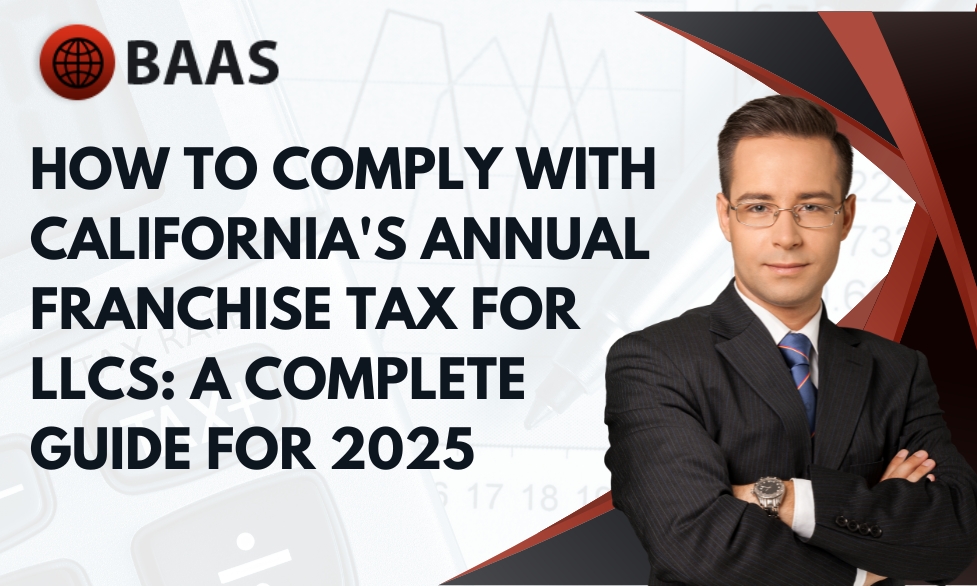How to Comply with California’s Annual Franchise Tax for LLCs: A Complete Guide for 2025
Starting and running an LLC in California especially in the Bay Area comes with incredible opportunities, but it also brings specific compliance obligations. One of the most important responsibilities every business owner must understand is the California Annual Franchise Tax.
Whether you’re just starting out or managing a growing company, knowing how to comply with the Franchise Tax helps you avoid penalties, maintain good standing, and focus on business growth.
This guide explains what the Franchise Tax is, how to file it, important deadlines for 2025, and how to stay compliant with California’s Franchise Tax Board (FTB).
What Is California’s Franchise Tax?
The Franchise Tax is an annual fee imposed by the California Franchise Tax Board (FTB) on most business entities that operate or are registered in the state. It applies to LLCs, corporations, limited partnerships (LPs), and limited liability partnerships (LLPs) — regardless of whether your business made a profit.
Think of the Franchise Tax as a required business obligation for the privilege of doing business in California. Even if your LLC didn’t generate income during the year, you’re still required to file and pay this tax to remain in good standing.
Pro Tip: Treat the Franchise Tax as a recurring business cost and include it in your yearly financial planning.
Who Must File the Franchise Tax?
The Franchise Tax applies to most entities operating or registered in California, including:
- Limited Liability Companies (LLCs)
- Corporations (C-Corps and S-Corps)
- Limited Partnerships (LPs)
- Limited Liability Partnerships (LLPs)
Certain newly formed businesses may receive a first-year exemption, but from the second year onward, the Franchise Tax generally applies to all registered entities.
Pro Tip: Verify your entity type and filing requirements with a CPA or accountant early to avoid compliance issues later.
When Is the Franchise Tax Due?
The due date depends on your business’s fiscal year.
For most LLCs, the annual Franchise Tax must be paid by the 15th day of the 4th month after the start of your tax year.
Example: If your tax year starts on January 1, the payment would be due on April 15, 2025.
Pro Tip: Set digital reminders or use accounting software to track all compliance deadlines, including Franchise Tax, payroll taxes, and sales tax filings.
How to File and Pay the California Franchise Tax
Filing the Franchise Tax involves submitting specific forms to the Franchise Tax Board and making your payment.
Step 1: Determine Your Filing Requirements
Confirm your business type, tax year, and income sources to understand which forms apply to your LLC.
Step 2: Prepare and File Required Forms
Commonly required forms include:
- Form 3522 – Annual Franchise Tax payment voucher
- Form 3536 – Estimated fee payment (if applicable)
- Form 568 – LLC Return of Income
Step 3: Submit Payment
Payments can be made online through the FTB’s Web Pay system or mailed with the appropriate voucher.
Step 4: Keep Documentation
Save copies of all forms and payment confirmations. These records help maintain accurate bookkeeping and are essential in case of an audit.
Pro Tip: If you work with a professional accounting firm, they can manage the entire process — ensuring accurate filings and timely payments.
Penalties for Missing the Franchise Tax Deadline
Failure to file or pay the Franchise Tax on time can result in:
- Late payment penalties and interest charges
- Suspension or forfeiture of your LLC’s active status
- Ineligibility to conduct business or sign contracts in California
Pro Tip: Even if your business is inactive or earns no income, always stay compliant by filing the required forms each year to maintain good standing with the state.
Why Bay Area Businesses Trust Local Accounting Experts
Navigating California’s business tax requirements can be complex — especially for small business owners balancing daily operations. Partnering with a professional accounting firm simplifies compliance and helps you stay organized.
At Bay Area Accounting Solutions (BAAS), we specialize in helping LLCs across Fremont, Oakland, San Jose, and San Francisco manage Franchise Tax obligations efficiently.
Our services include:
- Franchise Tax filing and compliance management
- LLC bookkeeping and record maintenance
- Payroll and sales tax management
- Financial reporting and analysis
- Cloud-based accounting support for real-time insights
With expert local guidance, your LLC can remain compliant, accurate, and stress-free throughout the year.
Conclusion
Complying with California’s Annual Franchise Tax is essential for every LLC operating in the state. Whether you’re launching a new company or managing ongoing operations, understanding the requirements, filing correctly, and meeting deadlines keeps your business in good standing and avoids costly disruptions.
By partnering with Bay Area Accounting Solutions, you’ll have a trusted financial partner ensuring all filings are handled on time while you focus on growing your business.
Need help managing your Franchise Tax filings? Contact Bay Area Accounting Solutions today we’ll take care of your compliance while you focus on building success.
FAQ — California Franchise Tax Compliance for LLCs
Q1: Who is required to pay the Franchise Tax in California?
All registered business entities — including LLCs, corporations, and partnerships — must pay the annual Franchise Tax.
Q2: Are new LLCs exempt from paying in their first year?
Yes, newly registered LLCs may qualify for a first-year exemption, but must pay the tax starting in the second year.
Q3: How can I make my Franchise Tax payment?
You can pay online using the Franchise Tax Board’s Web Pay system or by mailing the required payment voucher.
Q4: What happens if I miss the deadline?
Missing the payment deadline can result in penalties, interest, and suspension of your LLC’s legal status.
Q5: Should I hire a professional to handle Franchise Tax filings?
Yes. A professional accountant or bookkeeping firm ensures accurate filings, avoids costly mistakes, and keeps your business compliant with California regulations.



